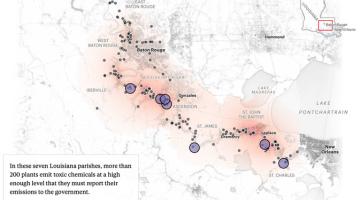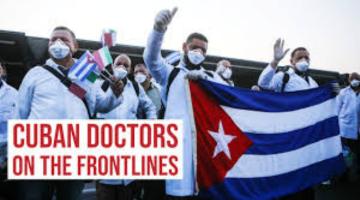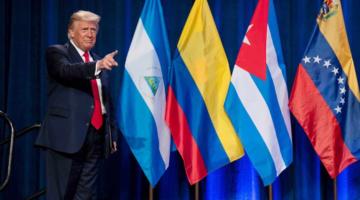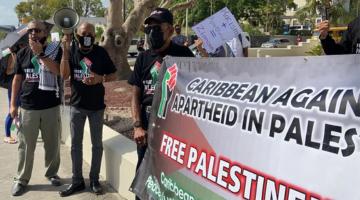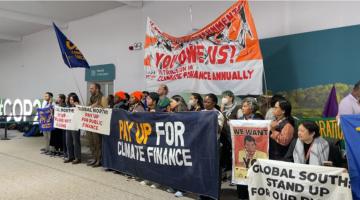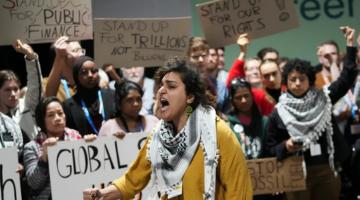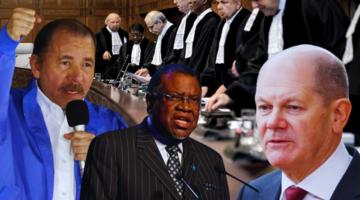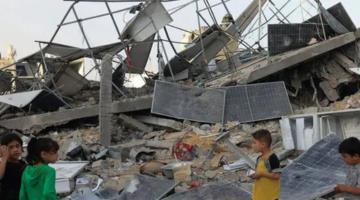Barbados Prime Minister Mia Amor Mottley's comments at COP26, the United Nations Climate Change Conference held in Glasgow, provided an impassioned call for global action on climate change. But what does it mean to beg for your life from the white neocolonial powers who have destroyed the earth?
The tiny eastern Caribbean country of Barbados -- with a population of just 287,371 people and a land mass of just 167 square miles -- has been punching well above its weight of late. Under the control of the British monarch since the first permanent white settlers arrived from England in 1627, Barbados, in a few weeks time, will transition from a parliamentary constitutional monarchy to a parliamentary republic. The island nation is at long last ditching the hereditary monarch as the head of state, currently Queen Elizabeth II (also known as “Elizabeth the Second, by the Grace of God, Queen of Barbados and of Her other Realms and territories Queen, Head of the Commonwealth”), and replacing her with a democratically elected president. Meanwhile, the current Prime Minister of Barbados, the dynamic Mia Amor Mottley, has been using the world stage as a platform to indict the west for its complicity in both causing global crises, and for their absolute apathy in responding to them. Witness Mottley’s viral “Get up, stand up” speech at the United Nations General Assembly in New York this past September, where she addresses the pandemic, climate change, poverty, and food insecurity. Or watch her impassioned November 1 address to COP26, the United Nations Climate Change Conference held in Glasgow.
Barbados, like much of the Caribbean, is facing what has been called an “existential threat” from climate change as rising sea levels, the destruction of underwater ecologies, and increasingly powerful hurricanes have the potential to wipe the archipelago off the map. In her COP26 address, Mottley demonstrates that she is acutely aware of this threat, as she is of the “reckless” and “dangerous” nature of the half-hearted attempts by the G7 countries to address climate change.
Mottley’s speech has garnered praise for its stark and unvarnished reminder of the consequences of inactivity on climate change. But it has also sparked another response: a cynical shrug of the shoulders and a “so what?” Given the urgency of the climate emergency, does it make sense for an obviously gifted politician to fly around the world to conferences and assemblies to make these performative appeals in the halls of white power? Should leaders of the smaller, darker nations go begging help from the larger, paler nations when help has never been forthcoming? And what of the fact that Mottley herself is deeply imbricated with these same demonic powers? She was more than willing to develop a pay-to-stay plan during the pandemic that generated national income by encouraging the wealthy citizens of the global north to work remotely from Barbados. She re-implemented a visa requirement for Haitians, themselves struggling with the question of climate change. The Barbadian Defense Forces work closely with SOUTHCOM, even though the Pentagon, as is well known, is the largest single emitter of CO2 in the world. Meanwhile, Ottley’s recent meeting with US Vice President Kamala Harris was as civil, tepid, polite, and uninspired as tea with the Queen of England herself.
Therein lies the contradiction. Mottley’s speech at Glasgow is certainly good. Her delivery is undeniably powerful. Here analysis is clearly on point. But it is also a depressing and quixotic statement on Black sovereignty when a country like Barbados -- a country that is only just beginning to break the chains of colonialism -- must beg for its life from the neocolonial powers. When pretty speeches are a substitute for direct action, while justice is invoked without plans for reparation, we can be damn sure those existential, ecological threats will be realized in the Caribbean, and everywhere Black people live. And they will not mourn us on the front line.
“Will they mourn us on the front line?” Speech at the Opening of the World Leaders Summit of the United Nations Climate Change Conference (COP26), November 1, 2021
Mia Amor Mottley
…. The pandemic has taught us that national solutions to global problems do not work. We come to Glasgow with global ambition, to save our people, and to save our planet. But we now find three gaps. On mitigation: climate pledges are NDCs. Without more, we will leave the world on a pathway to 2.7 °C and, with more, we are still likely to get to 2°C. These commitments, made by some, are based on technologies yet to be developed. And this is at best reckless and at worst dangerous. On finance: we are $20 billion dollars short of the $100 billion and this commitment, even then, might only be met in 2023. On adaptation: adaptation finance remains only at 25%, not the 50/50 split that was promised nor needed given the warming that is already taking place on this earth. Climate finance to frontline small island developing states declined by 25% in 2019. Failure to provide the critical finance, and that of loss and damage, is measured, my friends, on lives and livelihoods in our communities. This is immoral. And it is unjust. If Glasgow is to deliver on the promises of Paris, it must close these three gaps.
So I ask to you: what must we say to our people living on the front line in the Caribbean, in Africa, in Latin America, in the Pacific, when both ambition and, regrettably, some of the needed faces at Glasgow are not present? What excuse should we give for the failure? In the words of that Caribbean icon Eddy Grant: “Will they mourn us on the front line?” When will we, as leaders across the world, address the pressing issues that are truly causing our people angst and worry, whether it is climate or whether it is vaccines? Simply put: when will leaders lead? Our people are watching and our people are taking note. And are we really going to leave Scotland without the resolve and the ambition that is sorely needed to save lives and to save our planet? How many more voices and how many pictures of people must we see on these screens without being able to move? Or are we so blinded and hardened that we can no longer appreciate the cries of humanity? I have been saying to Barbadians for many years that many hands make light work.
Today, we need the correct mix of voices, ambition, and action. Do some leaders in this world believe that they can survive and thrive on their own? Have they not learned from the pandemic? Can there be peace and prosperity if one third of the world, literally, prospers and the other two thirds of the world live under siege and face calamitous threats to our well being? What the world needs now, my friends, is that which is within the ambit of less than 200 persons who are willing and prepared to lead. Leaders must not fail those who elected them to lead. And I say to you there is a sword that can cut down this Gordian knot. And it has been wielded before. The central banks of the wealthiest countries engaged in $25 trillion of quantitative easing in the last 13 years. 25 trillion. Of that, $9 trillion was in the past 18 months - to fight the pandemic. Had we used that $25 trillion to purchase bonds to finance the energy transitions or the transition of how we eat or how we move ourselves in transport, we would now, today, be reaching that 1.5 °C limit that is so vital to us.
I say to you today in Glasgow, that an annual increase in the [Subsidy Dependence Indices] of $500 billion a year for twenty years put in a trust to finance the transition is the real gap, Secretary General, that we need to close. Not the $50 billion being proposed for adaptation. And if $500 billion sounds big to you, guess what? It is just 2% of the $25 trillion. This is the sword we need to wield. Our excited one hour into this event if far less than it was six months ago leading up to this event. Can we, with those voices and these pictures from Sir David [Attenborough] and others, find it within ourselves to get the resolve to bring Glasgow back on track or do we leave today believing that it was a failure before it starts?
Our world, my friends, stands at a fork in the road - one no less significant than when the United Nations was formed in 1945. But then, the majority of our countries here did not exist. We exist now. The difference is we want to exist 100 years from now. And if our existence is to mean anything, then we must act in the interest of all of our people who are dependent on us. And if we don’t, we will allow the path of greed and selfishness to sow the seeds of our common destruction. The leaders of today - not 2030; not 2050 - must make this choice. It is in our hands. And our people and our planet need it more than ever. We could work with who is ready to go because the train is ready to leave. And those who are not yet ready, we need to continue to encircle and to remind them that their people - not our people - that their citizens need them to get on board as soon as possible.
Code red! Code red!
To the G7 countries: Code Red! Code Red!
To the G20: Earth to COP, that’s what it says? Earth to COP?
For those who have eyes to see, for those who have ears to listen, and for those who have a heart to feel: 1.5 °C is what we need to survive, 2 °C, yes, S[ecretary] G[eneral], is a death sentence for the people of Antigua and Barbuda, for the people of the Maldives, for the people of Dominica and Fiji, for the people of Kenya and Mozambique, and yes, for the people of Samoa and Barbados. We do not want that dreaded death sentence. And we have come here to say: “Try harder.” Try harder because our people, the climate army, the world, the planet, need our actions now - not next year, not in the next decade. Thank you.
*Transcribed from the video recording by the editors of the Black Agenda Review.

